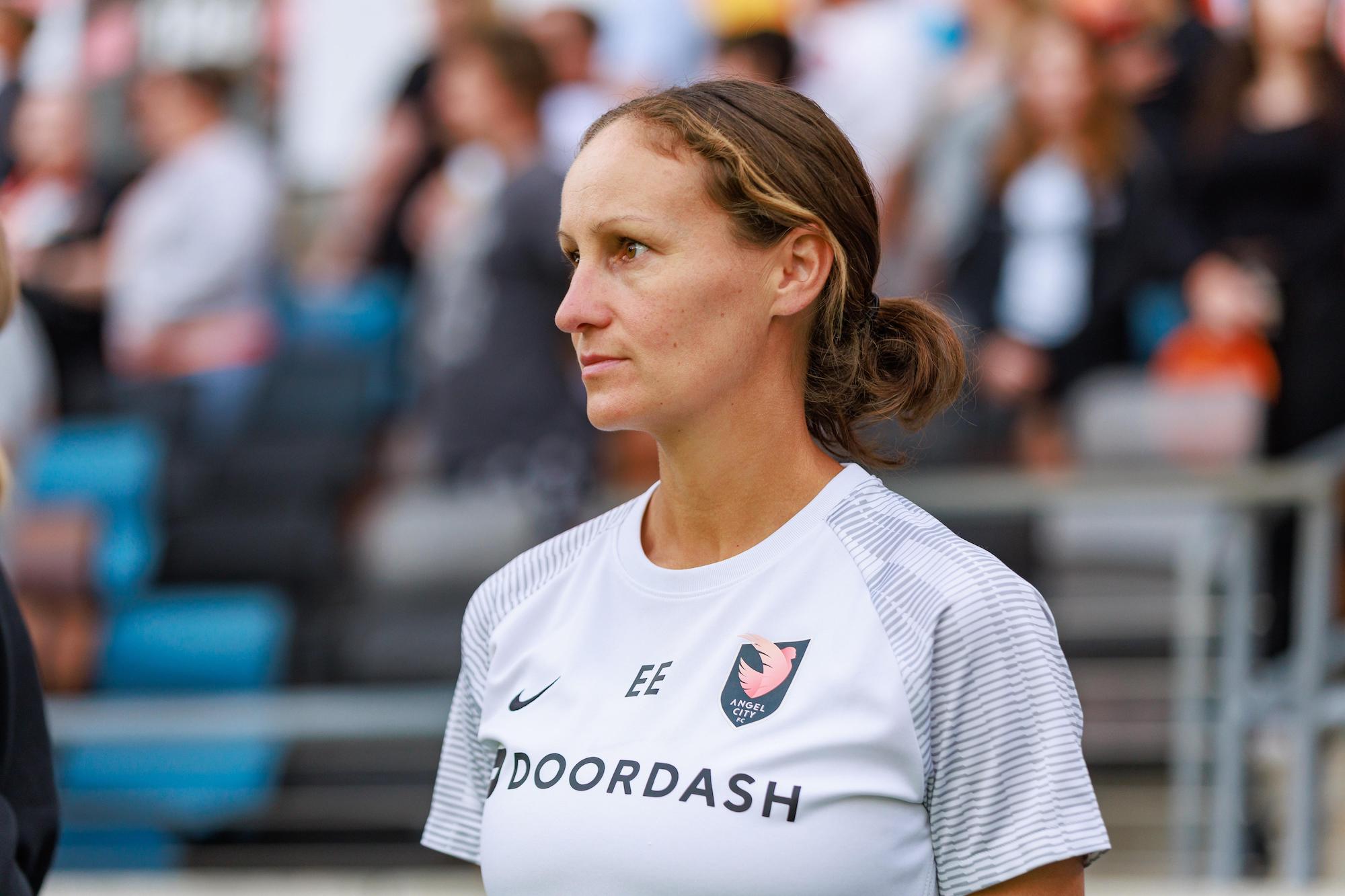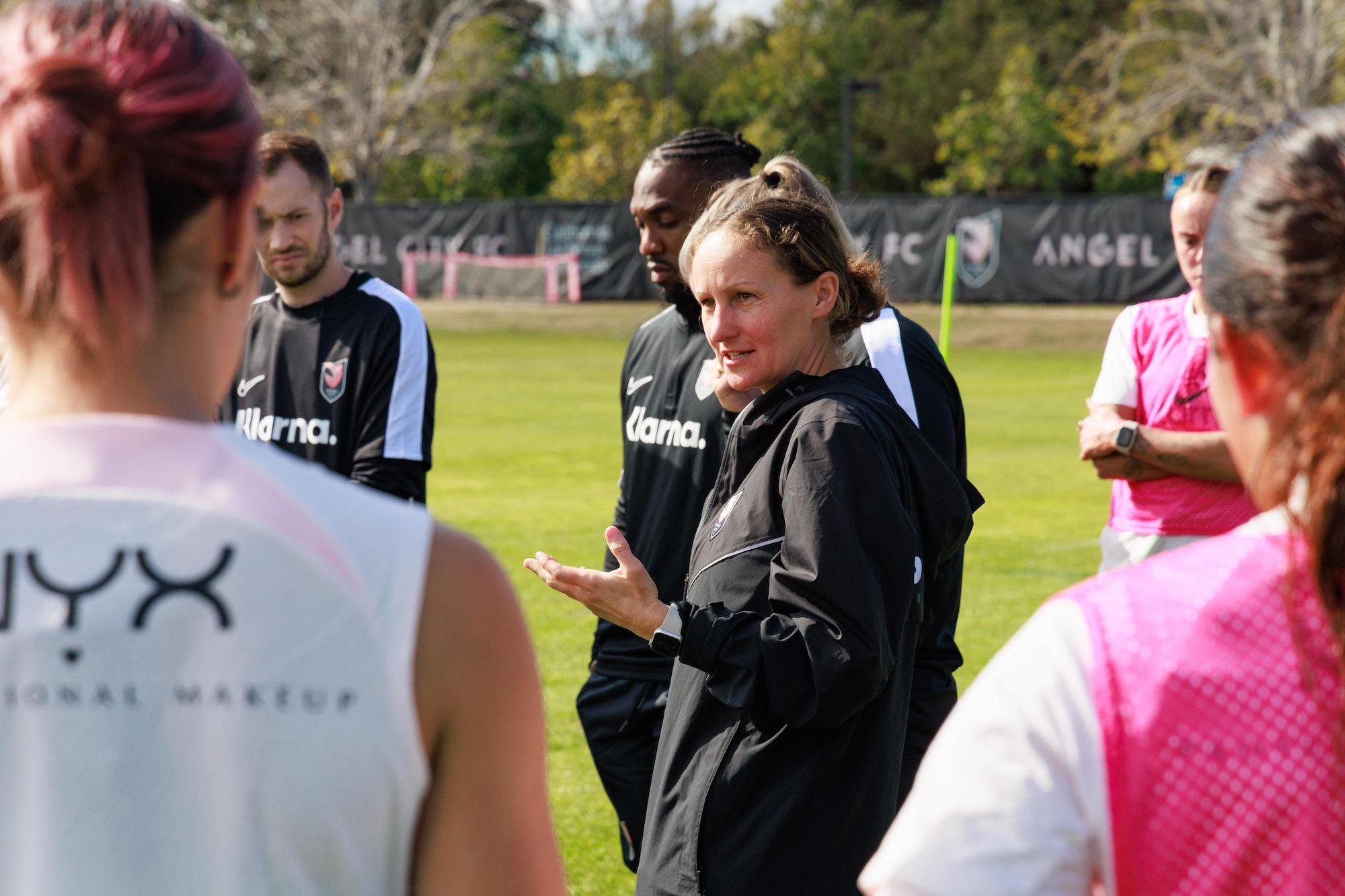
Angel City First Assistant Coach Eleri Earnshaw never imagined herself as a coach. Growing up in North Wales, she had her sights set on playing professionally in the US, something that was just becoming a possibility when she was a teenager.
“It was really the 1999 World Cup that made me think, ‘gosh, that's the place to be,’” she remembers. “You hadn’t seen crowds like that in the UK—or anywhere else.”
Like millions of kids her age, she was especially obsessed with US star Mia Hamm. “I searched high and low for her soccer boots—I think they were Nike Tempos—and I couldn’t find them anywhere,” she says. “My dad found them somehow and had them shipped from the US because I wouldn't stop talking about it for like, six months.”
Earnshaw had an upbringing that will be familiar to many women from footballing countries: she grew up surrounded by soccer, but her only opportunities to play were with boys. Her earliest memories of the game are playing in the backyard with her brother, and in the street, from one driveway to another, with other kids in the neighborhood. Her brother, who was two years older, joined a club around age eight, which her dad coached.
“I'd be up on the sidelines kicking the ball against the fence,” she remembers. “One day, my dad was like, ‘do you want to join in?’ I was nervous, but I said yes—and I did quite well!”
She was the only girl on the team, which she stayed with until she was 14, when the Welsh federation’s rules said she had to join a girls’ team—except there weren’t any girls’ teams in her small town of Rhyl, or anywhere nearby. She started making an hour-and-a-half train trip four times a week after school to play for Bangor City, the closest women’s team.
In the meantime, Earnshaw had also begun her international career, making the Wales U-14s when she was 11; she was to work her way through the youth system and make her senior debut at age 17. After two seasons at Bangor City, she signed for Arsenal, moving to London to live full time at the club’s academy.
Alongside England internationals Alex Scott, Anita Asante, and Lianne Sanderson, she soon moved up to the senior team. Arsenal was a pioneer in the women’s game, earning nominal support from the men’s side at a time when that was all but unheard of, and dominated the domestic competition in the 90s and 00s. In 2004, the team won the domestic double the same year the men’s side won the league. “We got to go on those open-top buses” when the club paraded through London, Earnshaw remembers. “It was like, [Thierry] Henry, [Patrick] Viera, star-studded. And we got to go on the bus behind.”
But despite that success, full professionalism, let alone the kinds of crowds that now turn out for high-profile WSL and Champions League games, were still a pipe dream in the birthplace of the game.
So when Earnshaw met Emma Hayes, who had played her youth football at Arsenal and was then coaching at an American college, she was all ears. “[Emma] came over to watch a session one day, and when the session ended, she said, ‘who's that young kid?’” Earnshaw remembers. The young kid was her.
The memory of the 90,000-odd fans who had filled the Rose Bowl for the 1999 World Cup final was still fresh in Earnshaw’s mind when Hayes invited her to play college ball in the States. “All I knew about the US was, that's the place to play,” she remembers. “That's where there's a professional league. That's where they’re investing money. I was like, ‘sure!’”
“I probably should have done more research,” she laughs. “But the opportunity just drew me to it.”
Earnshaw followed Hayes to Iona College in Westchester County, New York. Hayes’s three-year tenure there met with mixed success, the team winning only three games in her first year, but improving to 10–1–8 (W–L–D) in 2004, when Earnshaw arrived. Hayes moved Earnshaw to center back—she had been an attacking mid—and named her a captain as a freshman. “I played every single minute,” she remembers. “I had a great time there.”
By the time she finished college, though, the Women’s United Soccer Association—the first US league and first fully professional women’s league anywhere in the world—was a thing of the past. With no professional opportunities on the horizon, Earnshaw finished out her NCAA eligibility while earning a master’s at Long Island University in Brooklyn, staying on afterwards as a coaching assistant.

“I'd always planned on playing,” she says. “Nothing else was in the back of my mind—it should have been, probably—but when my playing career was kind of forced to an end, I got into coaching to stay in the game, but quickly came to love it.”
Coaching turned out to be a natural fit. “I’m really analytical,” she says. “So I love the tactical side of the game, the problem solving, just trying to find a tactical edge over an opponent. And I'm super competitive.”
Earnshaw was first hired at Angel City as a performance analyst. Her main role was analyzing film, both of ACFC and opponents, and the team through what went right or wrong on a specific play, or identifying ways to expose opposing defenses.
She loves the tactical side of the game, but ultimately she also wanted to be on the training field with the players. “Freya [Coombe, ACFC’s former head coach] asked me to do a field session one day, and the players seemed to like it,” Earnshaw says. “So they asked if I wanted to be on the field more, and I was like, ‘I would love to be on the field!’”
She’d only coached college and semi-pro soccer before—first at LIU, then Central Connecticut State, Yale University, and finally the Gotham Reserves, among other teams—and the jump to an NWSL first team was intimidating at first. “Players at this level know the game inside and out,” she says. “And if you don’t, they’ll see right through you.” She names midfielder Amandine Henry, a 15-year veteran of the international game who’s been called the best No.6 in the world, as one example.
Preparation, Earnshaw says, is key. “You have to be on every minute,” she explains. “You know you're going to get certain questions, or you're going to have to problem solve.”
That’s on each member of the coaching staff as individuals, but it also relies on a strong coaching philosophy and on-field vision from the staff as a group. “You have to believe what you're saying,” she says. “So I think coming to a collective understanding of what we're trying to do as a staff and then being able to deliver that with conviction to players,especially players who have some experience—you've got to know what you're talking about.”
Earnshaw is close to earning her UEFA A license—a notoriously difficult certification—before moving onto the pro course. “It’s a very high standard and a lot of work,” she says. “I'm in the course with other ex-pros and they don't take it easy on you just because you played the game!”
Outside of soccer, she’s also pursuing a PhD in performance psychology. She has one class to finish before she starts her dissertation, which she plans to write about the creation of high-performance environments—like the one she and the rest of Head Coach Becki Tweed’s staff have worked to create. “I'll be interviewing a lot of people, hopefully coaches and GMs that have been in the league—so Becki, Ang [Hucles Mangano, ACFC’s GM], get ready!” she laughs.
At Angel City, Earnshaw’s journey has come full circle: she’s coaching a club that counts Mia Hamm among its owners and plays just a short drive (depending on traffic) from where 90,000 fans watched the US win the World Cup in 1999.
“It's crazy to look back at and think, I was a young kid aspiring to—I don't even know what I was aspiring to,” she says. “But I was so moved by what was happening in the US, and at the Rose Bowl specifically. To now be here is pretty amazing.”

